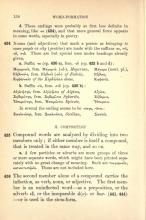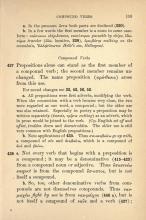435. Compound words are analyzed by dividing into two members only; if either member is itself a compound, that is treated in the same way, and so on.
a. A few particles or adverbs are mere groups of three or more separate words, which might have been printed separately with no great change of meaning. Such are τον-γαρ-οῦν, κατ-αντι-πέρᾱς. These are not included here.
436. The second member alone of a compound carries the inflection, as verb, noun, or adjective. The first member is an uninflected word— as a preposition, or the adverb εὖ, or the inseparable ἀ(ν)- or δυσ-(§§ 441, 444)— or is used in the stem form.
a. In the pronoun ὅστις both parts are declined (§ 220).
b. In a few words the first member is a noun in some case-form.
νεώσ-οικοι ship-houses
ναυσί-πορος passable by ships
ὁδοι-πόρος traveler (ὁδοι- locative, § 228)
ὀρει-βάτης walking on the mountain
Ἑλλήσ-ποντος Helle's sea, Hellespont


